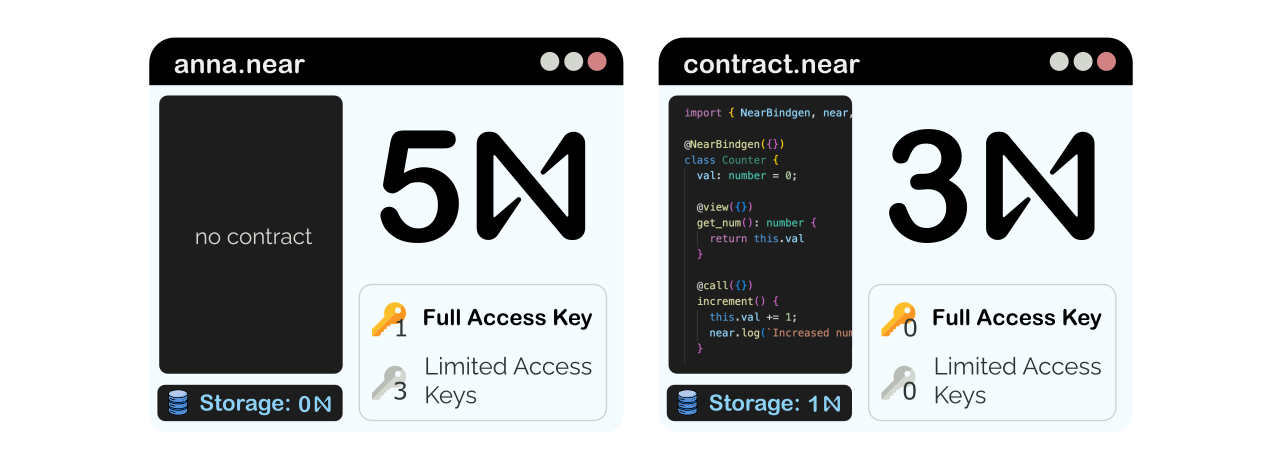NEAR Accounts
Users participate in the NEAR ecosystem through their NEAR accounts. These accounts are identified by a unique address, can optionally hold a smart contract, and are controlled through Access Keys.
By signing transactions with their account, users can:
- Send and receive digital assets (such as tokens or collectibles)
- Create and interact with on-chain applications known as smart contracts
- Control accounts in other chains (such as Ethereum or Bitcoin) ✨
- Help onboard new users by covering the costs of their transactions (gas fees)
You have multiple ways to create an account, you can sign-up using your email, get a mobile wallet through telegram, or create a web wallet
Account Model Overview
Let's take a closer look at the different elements that compose the NEAR account model.

Account ID
NEAR natively implements two types of accounts:
- Named accounts such as
alice.near, which are simple to remember and share - Implicit accounts such as
0xfb9243ce..., which are derived from a private key
Permissions Through Access Keys
NEAR accounts can have multiple keys, each with their own set of permissions:
- You can easily swap keys if one gets compromised
- You can use keys as authorization tokens for third-party applications
Simple to Develop Smart Contracts
NEAR accounts can optionally hold an application - known as a smart contract - which can be written in Javascript or Rust.
Multi-Chain Connectivity with NEAR
Supported Networks
Chain Signatures lets NEAR account sign and execute transactions across multiple blockchains, seamlessly and securely
Learn MoreWhy Choose Chain Signatures?
Manage interactions with external blockchains from one NEAR account. Simplifies key management and reduces the need for multiple wallets
Write smart contracts on NEAR that directly sign for cross-chain transactions, cutting down on code redundancy and potential points of failure
Decentralized signing process using Multi-Party Computation. No single entity controls the signing key, reducing centralized custodianship risks
Build DeFi applications leveraging Bitcoin liquidity, atomic swaps, and cross-chain NFT platforms with native cryptocurrency payments
Comparison With Ethereum
If you're familiar with development on Ethereum, it's worth making a quick note about how accounts are different. The table below summarizes some key differences:
| Ethereum Account | NEAR Account | |
|---|---|---|
| Account ID | Public Key (0x123...) | - Native named accounts (alice.near) - Implicit accounts ( 0x123...) |
| Secret Key | Private Key (0x456...) | Multiple key-pairs with permissions: - FullAccess key- FunctionCall key |
| Smart Contracts | Synchronous execution | Asynchronous execution |
| Gas Fees | In the order of dollars | In the order of tenths of a cent |
| Block Time | ~12 seconds | ~1.3 second |